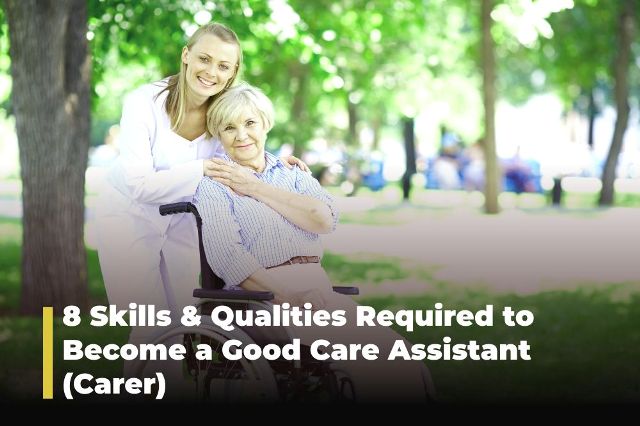If you are wondering how to be a good carer? or the required qualities & skills to be a carer, carer allowance, carer payment eligibility, and many other queries, then you must go through this well-explained article.
We believe that with experience, you can pick up new expertise and technical skills. But there are other traits that are simply ingrained in suitable people; some of them are inherent and sometimes impossible to develop.
Read Also: How to Become A Professional Cuddler
Find out if you have the abilities and characteristics required to succeed in the field before you begin working as a caregiver or care assistant.
The health care assistant skills and qualities listed below are some of the most crucial ones you should have in order to provide individuals you care about the attention and support they deserve.
8 Skills & Qualities Required to Become a Good Care Assistant (Carer)
Let’s go through the list of essential skills for health care assistant;
1. Great Communication Skills
Very first skills for health care assistant For many reasons, having effective communication skills is a crucial quality. A care assistant’s everyday interactions with team members and residents include communication. Speaking with other staff members could mean sharing any issues or changes you’ve seen, or it could entail organizing future plans.
On the other hand, interacting with residents is crucial to their general wellbeing. Since socialization is so crucial in care settings, a polite discussion could be all that’s needed to improve someone’s attitude. Asking residents how they are doing and if there is anything they need help with is another way to communicate with them. It’s crucial that these inquiries are made in a suitable and efficient manner.
2. Empathy and Patience
Effective carer possesses empathy and the capacity to imagine themselves in the position of the individuals they seek. Good caregivers are able to do this because it enables them to thoroughly comprehend the needs of their service users. They will then personalize the care they give to those needs, ensuring high-quality, person-centered support. A competent caregiver will always be patient and recognize that what you accomplish, not how long it takes you to do it, is what matters.
3. A Caring Nature
You must be naturally compassionate if you wish to work as a care assistant in a nursing home. As a care assistant, you will be expected to look after the physical and mental wellbeing of numerous residents. Some may need assistance with hygienic duties, while others may require assistance with a chronic condition or learning handicap.
If you have a heart for helping people, you will be rewarded with the knowledge and satisfaction of knowing that you have improved the lives of those you care about. Professionals with enthusiasm who are searching for a vocation rather than just a job are needed in the caring industry.
4. Time Management and Organisation Skills
To be a good carer, you must have good management skills. As a carer, you will become responsible for certain aspects of your client’s home, including food planning, shopping and cooking, doing household chores, paying bills, posting letters, and making sure your client turns up to their medical appointments. You will also need to ensure your client’s home environment is safe, warm and comfortable. This is a lot to deal with, so, as a carer, you need to be organized by using lists and having a good memory.
5. Carers Should be Highly Observant
You must be aware that an elderly person’s physical or mental health can change significantly in a short amount of time if you are caring for them. A skilled caregiver must be perceptive and vigilant, recognizing the early warning signals of decline. Anything from poor mood, decreased appetite, weight loss, or gain, to increased disorientation, or irritation, can fall under this category. The outcome for your customer will be better the sooner you act.
6. A Willingness to Learn
One could contend that this is the most crucial competency for a care assistant. You’ll be expected to complete a lot of training while working in a care facility in order to advance your career. Therefore, it’s imperative that you be open to learning and eager to pick up new abilities. Unlike certain professions, your present academic credentials are not the only thing considered when applying to be a care assistant. Your personality and will to learn are seen as being more significant.
7. Reliability and Trustworthiness
As was previously stated, as a caregiver, you will play a crucial role in your client’s life by offering stability and security. As a result, you must be a trustworthy individual who is available whenever needed. A client must also be watched over to make sure they eat, drink, take their medication, and arrive at appointments on time. Keep in mind that there may be a cost for not accomplishing these things.
8. First-Aid Training
The fundamentals of first aid training enable you to remain composed and calm in an emergency situation before bringing your client for medical assistance. Your client will feel more secure knowing you have first-aid training since they will be well taken care of.
Read Also: What is a Patient care technician? Patient Care Technician Degree & Certification 2023
Some Carer Statistics & Facts
- 4.7% of the population in England and Wales are providing 20 hours or more of care a week.
- Every year, 4.3 million people become unpaid carers – 12,000 people a day (Petrillo and Bennett, 2022).
- 59% of unpaid carers are women (Census 2021). Women are more likely to become carers and to provide more hours of unpaid care than men.
- With the current cost of living crisis, carers are facing unprecedented pressure on their finances: a quarter of carers (25%) are cutting back on essentials like food or hearing and 63% are extremely worried about managing their monthly costs (Carers UK, State of Caring 2022).
- Over a quarter of carers (29%) feel lonely often or always (Carers UK, State of Caring 2022).
- Black, Asian and ethnic minority carers are more likely to be struggling financially.
Source: carersuk.org
Frequently Asked Questions
Q- Who is the Carer?
According to England.nhs.uk, A carer is anyone, including children and adults who looks after a family member, partner or friend who needs help because of their illness, frailty, disability, mental health problem or addiction and cannot cope without their support. The care they give is unpaid. When we refer to carers in this document, this is inclusive of both adult and young carers.
Q- How Many Types of Carers?
Home care
Live-in care
Overnight care
Dementia care
Alzheimer’s care
Respite care
Parkinson’s care
Convalescence care
Multiple Sclerosis care
Spinal injuries care
Bariatric care
Palliative care
Physical disabilities care
Q- What is Carer Allowance?
A payment or supplement known as a “carer’s allowance” is given to persons who look after a frail older person or someone with a handicap. If the caregiver does not get any other financial support, it may be paid in addition to another pension or benefit.
Q- Carer allowance number and Claim.
-You could get £76.75 a week if you care for someone at least 35 hours a week and they get certain benefits.
-You do not have to be related to, or live with, the person you care for.
-You do not get paid extra if you care for more than one person.
-If someone else also cares for the same person as you, only one of you can claim Carer’s Allowance.
Go to the Official website for full details: Carer Allowance Claim
Q- What is Carer Payment Eligibility in Australia?
You must provide full-time care for a person with a disability, a chronic illness, a mental illness, or who is elderly and frail in order to qualify for the Carer Payment in Australia. Both the caregiver and the person they are caring for must be qualified. Read the regulations that apply to your circumstance to see if you qualify.
You can get visit the official website: Carer Payment
Q- How to Apply for a Carer Visa in Australia
Carer visa Australia requirements: A carer visa is a permanent family visa you can apply for if you want to take care of a relative that requires medical, or physical assistance. There are two subclasses for a carer visa:
–Subclass 116 and
–Subclass 836
To get a carer visa you must have an eligible sponsor in Australia who genuinely needs your assistance.
Check Eligibility Criteria for a Carer and Sponsor Visa
Q- What is a Foster Carer?

Foster carer or foster parents provide children who cannot live with their own families for a variety of reasons with a safe, caring, and nurturing home. Foster care is a short-term service that seeks to place kids in a new, permanent home or reunite them with their biological families. Foster parents can come from a variety of situations and backgrounds, but they must have a spare bedroom and be prepared to dedicate their time to their foster children. Children in foster care may reside with relatives, in foster homes, or in facilities for groups.
Q- What is Foster Carer Pay?
You will be categorized as a self-employed foster care provider. Depending on where you reside, how experienced you are, and the dependency of the child, you might make a minimum of between £132 to £231 per week. Fostering costs of about £600 per week are offered by some organizations that work with kids who have more complex needs.
Q- What is Respite Carer?
When a person’s primary caregiver is away, respite care is temporary care. They might have made weekend travel plans or have a family gathering to attend. Or a client can want assistance in order to heal from an incident, an injury, or surgery.
Q- What is a Domiciliary Carer?
Professionals who assist people in maintaining their independence in their own homes through routine visits or live-in care are referred to as domiciliary carers, often known as home carers or private carers. Their primary responsibility is to help with daily chores, medication, and other activities that support quality of life.
Image source: freepik.com
